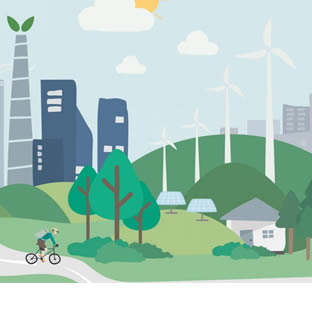Spirituality is fundamental on our path towards integral ecology. If we fail to cultivate our interior life, we cannot effectively care for the external world, and vice versa. Therefore, we need to “develop a spirituality” (LS 240) that helps us to perceive reality in an integral manner, recognizing it as a joyful mystery of communion and relationships. Spirituality provides the motivations we need for “a more passionate concern for the protection of our world” (LS 216; EG 261). It even enables us to experience “the intimate connection between God and all beings” (LS 234), allowing us to reach a mystical experience. We need that “interior impulse which encourages, motivates, nourishes, and gives meaning to our individual and communal activity”. Indeed, the life of the spirit must not be dissociated “from the body or from nature or from worldly realities, but lived in and with them, in communion with all that surrounds us” (LS 216). Nature must not be reduced to mere objects that we can know and, therefore, master. Its mystery is an invitation to savor, contemplate, and live. God has not revealed himself to increase our knowledge, but to establish a loving relationship with us. Indeed, all of creation…
Il titolo richiama un’urgenza nella scelta. Rinvia alla fine del tempo per prendere una decisione. Tale richiamo è un esempio della situazione in cui si trova l’umanità: dobbiamo adottare nuove attitudini se vogliamo garantire un presente più dignitoso e un futuro giusto alle generazioni future. Questa problematica è affrontata dalla Laudato Si’, che in questi giorni compie otto anni di esistenza e di interrogativi rivolti a tutta l’umanità. Viviamo in una crisi socio-ambientale, un fallimento morale che oltre a degradare e decimare le specie nella natura, opprime e toglie la vita a molti dei nostri fratelli e sorelle in modo ingiusto. Sia la natura che una gran parte dell’umanità gridano, chiedendo aiuto, mettendo in discussione il paradigma attuale e presentando la necessità di uno stile di vita nuovo che liberi, sia l’ambiente che l’umanità, in modo integrale. La teologia morale, in quanto scienza e in dialogo con le altre scienze, è chiamata a rispondere alla seguente domanda: cosa possiamo proporre come riflessione e fare in modo effettivo per risolvere questa richiesta socio-ambientale che interpella tutta la nostra generazione? Come Chiesa, come possiamo mostrare fiducia alle donne e agli uomini di oggi, e portare il Regno di Dio di fronte a…
This post asserts that the main cause of the current socio-environmental crisis is the dualistic anthropological conception that has prevailed in Western philosophy[i]. Indeed, Western culture has accentuated the separation between man and other creatures (ontic dualism), and has also divided the human being internally, making a clear separation between soul and body (ontological dualism). In this sense, the encyclical Laudato si’ affirms that “there can be no ecology without an adequate anthropology” (LS 118), and that we need to overcome those unhealthy dualisms, that “left a mark on certain Christian thinkers in the course of history” (LS 98). 1. Ontological dualism Ontological dualism distinguishes clearly between the body and the spiritual/rational dimension of man. The latter would be the most authentically human and, therefore, the body should be subordinated to it. The human being is described using “multiple oppositional pairs: body/soul, rationality/affectivity, need/freedom, nature/culture, instinct/morality, etc.” In the seventeenth century, Descartes makes a net separation between the rational soul and the body. The first would be the essence of man, who is characterized by his ability to think (res cogitans), while his body would be only a material addition that does not differ substantially from those of animals. Both…
Two recent crises have raised the question as to the legitimate use of coercive force: the Covid-19 pandemic and the Russian invasion of Ukraine. In the first case the coercive force mainly took the form of legal restrictions on various human activities such as work and travel; in the second case, coercive force is being exercised primarily in the form of sanctions and financial support for Ukraine (which makes possible the other kind of coercive force Ukraine is using to expel the invader). In both cases there has been much debate about the ethics of such measures. The purpose of this post is to consider briefly the ethics of the use of coercive force in responding to the ecological and social crisis depicted in Laudato sì. In Chapter 5 of that document there are various discrete but firm references to the need for such force (for example, §§ 167,175,181). This need arises out of the simple fact that when some parties attempt to respond to the crisis by introducing change other parties tend to obstruct this process. It is not realistic to imagine that all parties will freely cooperate in effecting the necessary change. But is it ethically legitimate to…
Last year, dott. Giorgio Del Signore, Bursar of the Alphonsian Academy, prof. Leonardo Salutati and myself launched a research project in the Academy entitled “The Governance of Change – at a time of ecological transition”. We had hoped to organize a summer school on this theme last July, but maybe we should have been more active in seeking participants – some very suitable applications did arrive but they were insufficient in number. Still convinced of the importance of on-going reflection on this matter, with their agreement, I am writing this post to present a new proposal to all interested parties. The idea is to create a kind of sub-blog within the blog of the Alphonsian Academy. The broad theme of the sub-blog remains the governance of change, meaning by this the way in which an appropriate response to the social and ecological crisis depicted in Laudato sì can be effectively organized and managed. This encyclical can be understood as a sort of manifesto regarding this response. The narrower focus of the sub-blog will be on the open ethical questions raised by Laudato sì. These questions need on-going reflection and a constant effort at deeper understanding. While welcoming contributions from all…





